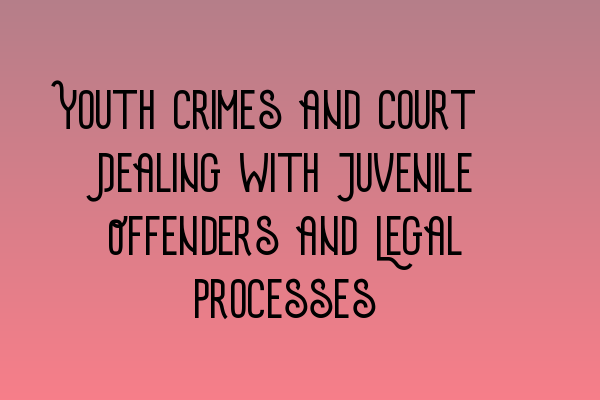Youth Crimes and Court: Dealing with Juvenile Offenders and Legal Processes
As criminal defense solicitors at SQE Criminal Law & Practice Law UK, we understand the importance of addressing youth crimes and the legal processes involved. Dealing with juvenile offenders requires a unique approach that takes into account their age, development, and specific circumstances. In this blog post, we will explore the various aspects of youth crimes, the court system, and the steps to ensure a fair and rehabilitative process for young offenders.
The Nature of Youth Crimes
Youth crimes refer to offenses committed by individuals who are under the age of 18. These offences can range from petty theft and vandalism to more serious crimes such as assault or drug-related offenses. It is essential to acknowledge that youthful offenders often face different challenges and influences compared to adult offenders. Factors such as peer pressure, lack of impulse control, and limited understanding of consequences can contribute to their involvement in criminal activities.
When dealing with youth crimes, the objective should be to address the underlying causes and promote rehabilitation rather than solely focusing on punishment. It is crucial to intervene early, provide support, and guide young offenders towards a positive path.
The Role of the Court System
The court system plays a vital role in dealing with youth crimes. Specialized youth courts are designed to handle cases involving young offenders, aiming to ensure a fair and appropriate legal process. These courts take into account the age and developmental stage of the offender, providing a more customized approach compared to adult courts.
In youth courts, the emphasis is on rehabilitation and education rather than punishment. Judges, solicitors, and other legal professionals work closely together to determine the most suitable outcome for the young offender. This may involve community service, rehabilitation programs, counseling, or other measures aimed at addressing the underlying issues contributing to the criminal behavior.
The Legal Process for Juvenile Offenders
When a young person is accused of a crime, they undergo a legal process that is different from that of adult offenders. Here is a brief overview of the steps involved:
- Arrest: If a young person is suspected of committing a crime, they may be arrested by the police. However, the police are encouraged to consider alternative measures, such as a formal warning or caution, before resorting to arrest.
- Interview: After the arrest, the young person is entitled to have an appropriate adult present during the police interview. The interview should be conducted in a manner that takes into account their age and understanding.
- Diversion: In some cases, instead of going through the formal court process, young offenders may be given the opportunity to participate in diversion programs. These programs aim to address the underlying issues and prevent reoffending.
- Court Hearing: If the case proceeds to a court hearing, it will be heard in a youth court. The young person will have legal representation, and the court will consider their age, background, and any relevant personal circumstances before determining the appropriate course of action.
- Sentencing: If the young offender is found guilty, the court will decide on an appropriate sentence that focuses on rehabilitation and addressing the root causes of the criminal behavior.
It is important to note that the legal process for juvenile offenders aims to protect and rehabilitate young offenders rather than simply punishing them. Solicitors specializing in youth crimes can provide valuable guidance and support throughout the legal journey, ensuring fair treatment and positive outcomes.
Related Articles:
For more information on legal processes and related topics, we recommend the following articles:
- Demystifying the Solicitors Qualifying Examination Format
- LLC Formation Made Simple: Step-by-Step Guide for UK Entrepreneurs
- LLC Formation: A Step-by-Step Guide for UK Entrepreneurs
- Business Regulations in the UK: A Comprehensive Overview
- Decoding Corporate Structures: A Comprehensive Legal Insight
In conclusion, youth crimes require a specialized approach that recognizes the unique circumstances and developmental stages of young offenders. The court system and legal processes play a crucial role in ensuring a fair and rehabilitative process for these individuals. By addressing the underlying causes and promoting rehabilitation, we can guide young offenders towards a brighter future and reduce the likelihood of reoffending.
